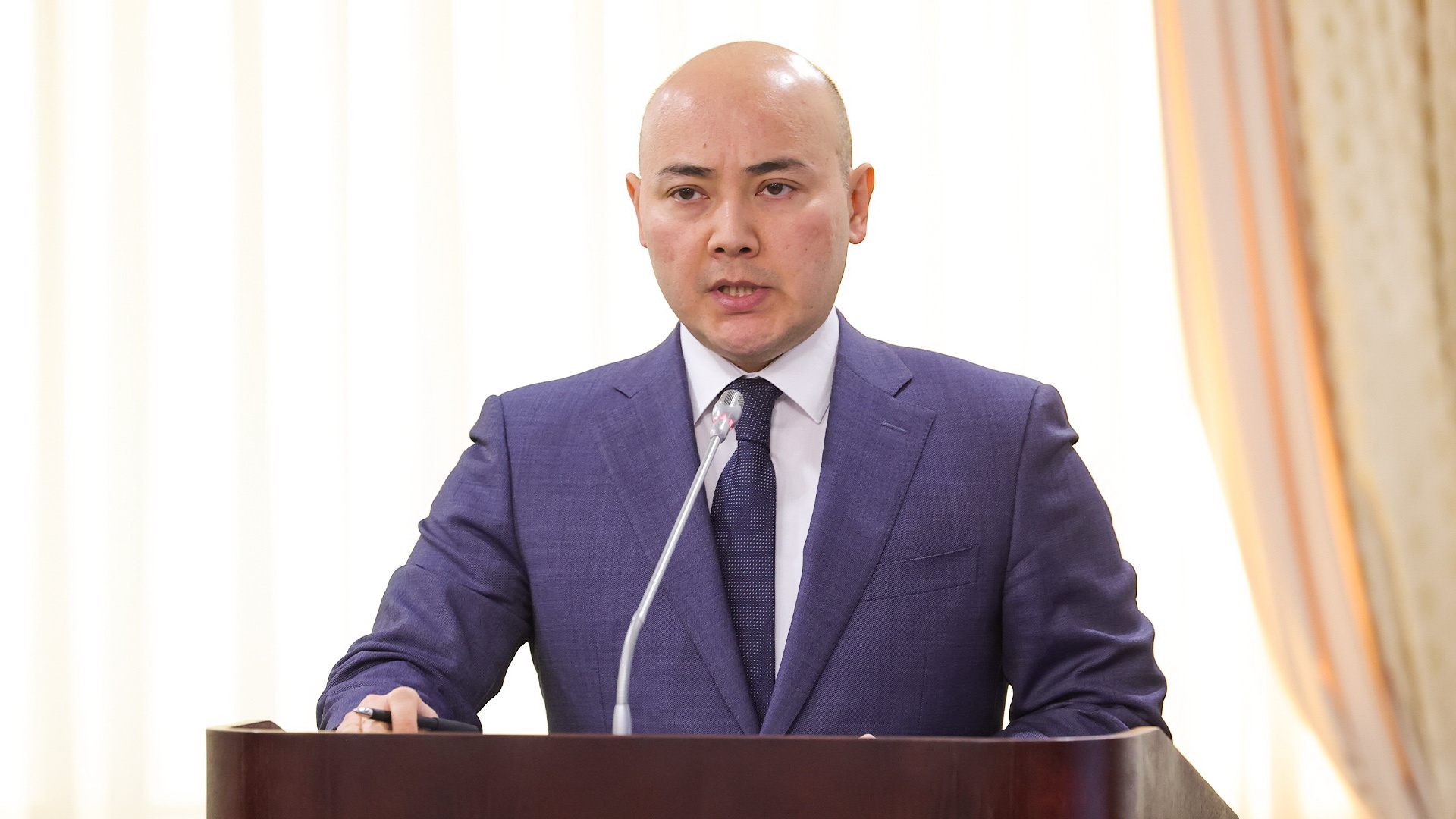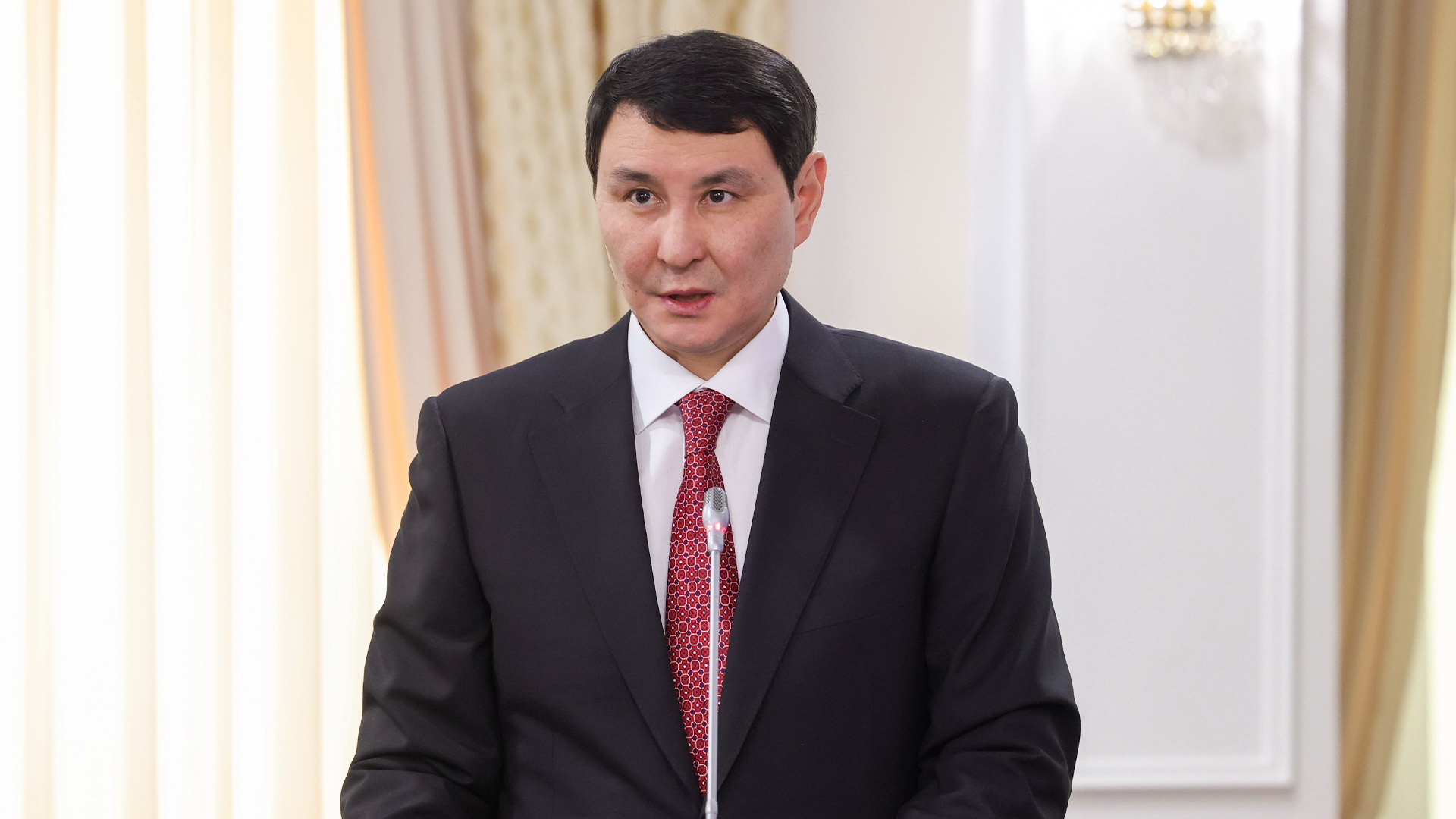12 December 2023, 19:00
 Results of socio-economic development of Kazakhstan and the implementation of the national budget for January-November of this year considered at the Government session. Reports were made by Minister of National Economy Alibek Kuantyrov, Deputy Chairman of the National Bank of Kazakhstan Vitaly Tutushkin, Deputy Prime Minister - Minister of Finance Yerulan Zhamaubayev.
Results of socio-economic development of Kazakhstan and the implementation of the national budget for January-November of this year considered at the Government session. Reports were made by Minister of National Economy Alibek Kuantyrov, Deputy Chairman of the National Bank of Kazakhstan Vitaly Tutushkin, Deputy Prime Minister - Minister of Finance Yerulan Zhamaubayev.
Alibek Kuantyrov in his report said that by the results of January-November of this year, the growth rate of Kazakhstan's economy amounted to 4.9%. Including growth in the real sector was 3.5%, in services sector 5.6%. Among industries, the greatest positive dynamics is observed in construction, trade, information and communication, as well as in transportation and warehousing.
The growth rate of investments in fixed assets for 11 months of the year amounted to 14.6%. The inflow of investments increased in a number of industries: information and communication by 2.8 times, in the sphere of transportation and warehousing by 58%, in trade by 34%, education by 17%, agriculture by 11%. In industry, investments increased by 8.5%, including in manufacturing - by 4.6%.
"In the regional context, the best indicators are noted in Mangystau region Turkestan, Pavlodar region and Abay region. According to preliminary results in January-October 2023, foreign trade turnover increased by 2.6% and amounted to more than $114 billion. Exports amounted to about $65 billion, with processed goods - about $21 billion. Imports exceeded $49 billion. In general, the positive trade balance amounted to more than $15 billion," the minister said.
Manufacturing industry in Kazakhstan also maintains growth rates: the volume of production increased by 3.4%. Positive dynamics was recorded in 13 regions, the largest increase is noted in Kyzylorda region, Kostanay region, in Abay region and in the city of Almaty. In terms of sectors, the growth of production is provided in mechanical engineering - about 27%, including 41% in the automotive industry, production of electrical equipment - more than 32%.
In addition, growth was recorded in such industries as food production by 1.9%, metal products by 3.7%, construction materials by 4.1%, plastic products by 5.1%. In light industry there is a growth of 12%, furniture - by 42%.
The volume of production in the mining industry increased by 5.2%. At the same time, gas extraction increased by 12%, oil extraction - by 7.8%, other minerals - by 13%. Extraction of metal ores decreased by 0.5%, mining services - by 2.6%, coal mining - by 5.8%.
The volume of construction works performed in the country increased by 12.6%. Positive dynamics was recorded in 18 regions, with the greatest growth in construction and installation work is noted in Mangystau region, West Kazakhstan region, in the regions of Zhetisu and Abay.
In January-November of this year in Kazakhstan commissioned more than 15 million square meters of housing, which is 15.6% more than the same period last year. The highest commissioning rates are observed in Astana, Almaty, as well as in the region of Ulytau and North Kazakhstan region.
In agriculture, the volume of gross output decreased by 8.4%. Akmola, Kostanay, North-Kazakhstan and Pavlodar regions showed a significant decrease. For all 7 economic indicators growth is noted in 5 regions - Abay, Zhetisu, Kyzylorda regions, as well as in the cities of Almaty and Shymkent.
To ensure further growth of the economy, the department proposes the following measures:
Deputy Chairman of the National Bank V. Tutushkin informed that global economic activity in November this year improved due to the stabilization of new orders, which supported a moderate increase in production. In Kazakhstan, the index of business activity for November amounted to 49.0 points. The index increased in manufacturing - 51.4 and construction - 50.2, but decreased in mining - 47.4 and services - 48.3. The country's business climate index remains in positive territory due to continued positive expectations of businesses on future business conditions.
Annual inflation slowed to 10.3% in November, the role of food and non-food factors is decreasing, while the contribution of the service component is growing. Nevertheless, the National Bank notes that a number of important price indicators indicate the persistence of inflationary pressure in the economy. Thus, monthly inflation in November amounted to 1.0%, exceeding both the historical average and the estimate of the target value. The dynamics of its stable part is also above the target level. In the structure of food products for the last month, the highest price growth was observed for vegetables, eggs, certain types of bakery products and cereals, among non-food products - for clothing and footwear, transportation, pharmaceutical products, for paid services - for housing and utilities tariffs, Internet and air travel. At the same time, it is expected that in the coming months annual inflation in Kazakhstan will reach single digits, i.e. will be below 10% level.
"The decline in both annual inflation and its forecasts allowed to reduce the prime rate to 15.75%. At the same time, certain factors and risks require maintaining monetary conditions at the current level for further stabilization of inflation," Tutushkin said.
Since the beginning of this year, the national currency has strengthened by 1% to 458.24 tenge per 1 U.S. dollar. The tenge has been supported since the beginning of the year by sales of currency from the National Fund ($8.8 billion since the beginning of the year).
Inflow of non-residents to the GS market for the reporting period amounted to $258 m. There is also an increase in seasonal demand from importers, associated mainly with the activation of the cycle of projects. Vitaly Tutushkin emphasized that the National Bank continues to adhere to the flexible exchange rate regime and does not conduct currency interventions.
Gross international reserves at the end of November amounted to $92.7 billion. Gold and foreign exchange reserves of the National Bank decreased by 2.8% (to $34.1 billion) since the beginning of the year due to a decrease in the balances of STB on foreign currency accounts with the NBRK, as well as currency conversion in order to pay the Ministry of Finance on its obligations.
Assets of the National Fund increased by 5.2% YTD (to $58.6 bln). The main growth was due to investment income by 7.9% (or $4.4 bln). Total revenues to the fund since the beginning of the year amounted to KZT4.4 trillion. Transfers from the National Fund to the republican budget were made in the amount of 3.9 trillion tenge, including the acquisition of shares of NC KazMunayGas JSC to finance the republican budget. 74 billion tenge was allocated to purchase bonds of Samruk-Kazyna to finance the Dostyk-Moyinty project.
Pension assets of the UNPF demonstrate positive dynamics. Since the beginning of this year they increased by 18.6% (up to 17.3 trillion tenge). The volume of investment income since the beginning of the year amounted to 1.3 trillion tenge, pension contributions amounted to 1.9 trillion tenge, early withdrawals amounted to about 255 billion tenge.
"The National Bank will monitor the development of the situation in the external and domestic markets and will continue to work to ensure macroeconomic stability and further reduce inflation," Tutushkin said.
 Deputy Prime Minister - Minister of Finance Yerulan Zhamaubayev in his report reported on the performance of public finances at the end of 11 months of this year. According to him, the state budget received 18.2 trillion tenge of revenues, the plan was executed by 98.6%. The republican budget received 12.6 trillion tenge of revenues, the execution of the plan - 94.4%.
Deputy Prime Minister - Minister of Finance Yerulan Zhamaubayev in his report reported on the performance of public finances at the end of 11 months of this year. According to him, the state budget received 18.2 trillion tenge of revenues, the plan was executed by 98.6%. The republican budget received 12.6 trillion tenge of revenues, the execution of the plan - 94.4%.
Non-fulfillment was mainly due to taxes, including CIT, VAT on imports, MET and ETP on crude oil. For CIT, this is attributed to a 24% decrease in the amounts of declared advance payments for 272 large taxpayers. The reason for non-fulfillment of the plan for VAT on imports is a decrease in the volume of imports of certain groups of goods and imports from the EAEU countries by 9%.
Non-fulfillment of the MET plan was affected by a 12% average decline in prices for major export commodities. The main non-fulfillment of the plan on ETP for crude oil was due to an 8% decrease in the actual ETP rate from the forecast figure. Over-fulfillment on non-tax revenues was mainly due to dividends on state shares.
"Revenues of local budgets were executed by 109.2% and amounted to 5.7 trillion tenge. The plan was overfulfilled by 478 billion tenge, including 425 billion tenge for taxes. Revenue plans have been exceeded in almost all regions, except for Almaty region. State budget expenditures were executed by 96.5%, republican - by 98.3%, local budgets - by 95.6%. The republican budget expenditures amounted to 20 trillion tenge. Non-fulfillment amounted to 336 billion tenge, of which 29 billion tenge - savings. The largest sums of non-utilization were formed in the Ministries of Internal Affairs, Industry and Construction, Emergency Situations, Culture and Information of the Republic of Kazakhstan," Zhamaubayev said.
According to the Minister of Finance, among the main reasons for non-disbursement - untimely delivery of goods by suppliers, the lengthy conduct of competitive procedures, lengthy procedures for concluding contracts, supplementary agreements, etc.," the Minister said.
Zhamaubayev reported on the expenditures of local budgets. They amounted to 12 trillion tenge, not fulfilled 531 billion tenge. This year the regions are provided with targeted transfers totaling about 2 trillion tenge. As of December 1, 1 trillion 752 billion tenge was allocated, of which 89.8% was utilized. Not fulfilled - 179 billion tenge, including savings - 3 billion tenge. The greatest non-utilization was in Astana, Mangystau region, Atyrau and West Kazakhstan regions.
Also for 11 months of this year, desk control covered about 507 thousand procedures of public procurement for the amount of 12 trillion tenge. As a result of inspections, violations were established for 72 thousand of them, the objects of state audit executed 93% of notices on elimination of violations.
In Kazakhstan this year conducted 2 thousand audit activities. In total, the audit covered more than 1.4 trillion tenge of budgetary funds. Financial violations for about 231 billion tenge were identified. Most of them were eliminated by restoring the supply of goods, rendering services and performing works, reimbursement to the budget and reflection on accounting. More than 2 thousand recommendations were given to improve and increase the efficiency of the audit objects.
#Budget #Economy #Government session"The comprehensive privatization plan for 2021-2025 provides for the sale of 658 objects. During the reporting period, 380 objects worth 330 billion tenge were sold and transferred to trust management with the right of subsequent redemption. 30 are at auction, 64 objects are directed to reorganization and liquidation. 184 on pre-sale preparation," Zhamaubayev summarized.
Stay updated about the events of the Prime minister and the Government of Kazakhstan - subscribe to the official Telegram channel
Subscribe